Today I want to talk about why we write, about what it says about our culture, and publishing’s place in capturing, sharing and preserving not just information, but the human experience.
Recording Our Experience
I’ve been collecting photos of carvings in trees – they are always simple messages, usually just two names in a heart. I’m fascinated by them – about stumbling upon moments from decades ago. Here are some of the older carvings I could find…
Of all the trees in the woods, this one has something to say:
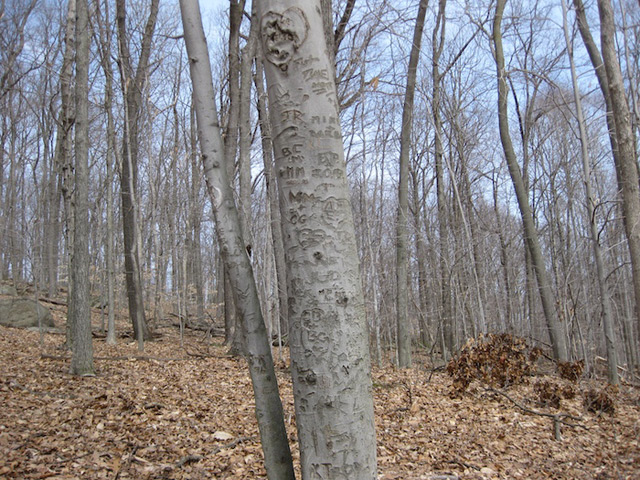
1972. Who is RS + KM and SS + SL? No idea. I wonder if even they would remember.
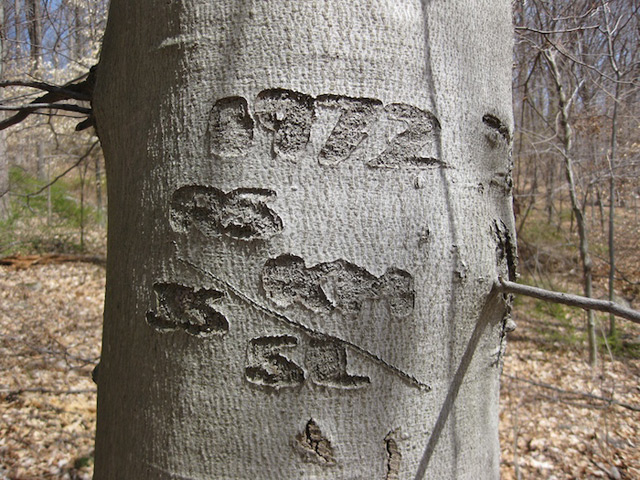
1974: DS + LO
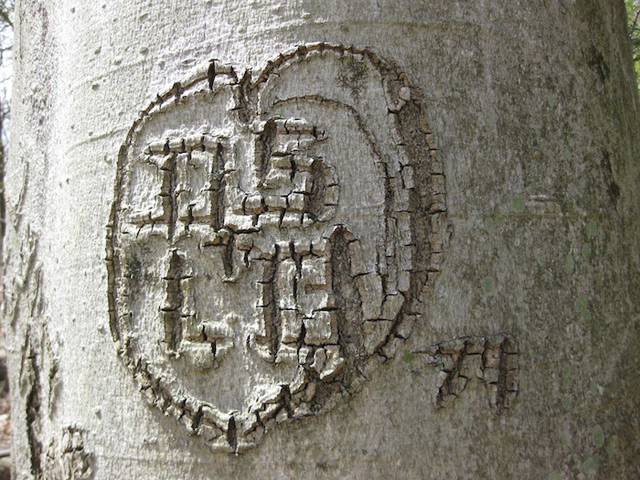
1975: Bev + John
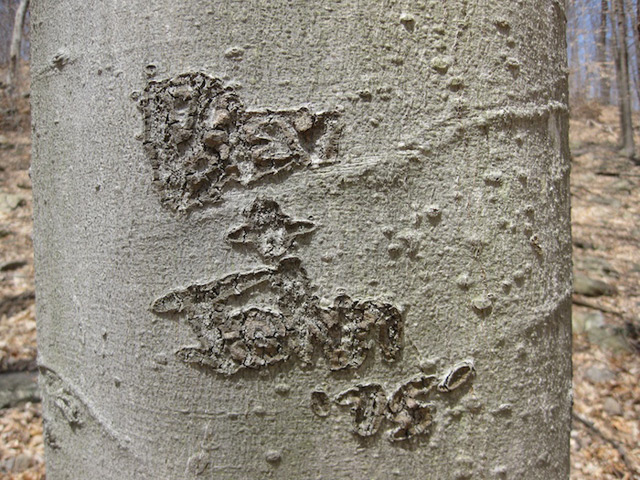
January 1, 1978: Dave + Patti
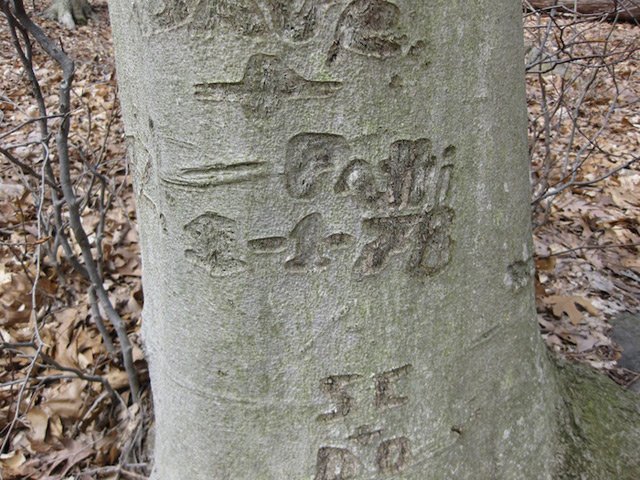
1979: JD + OR
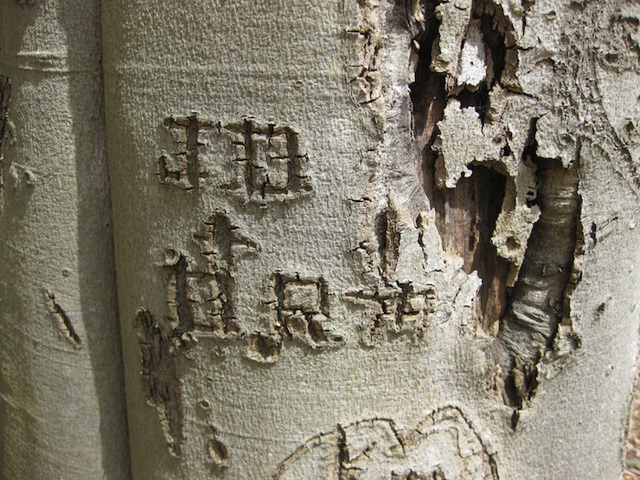
1982: Dan (unrelated)
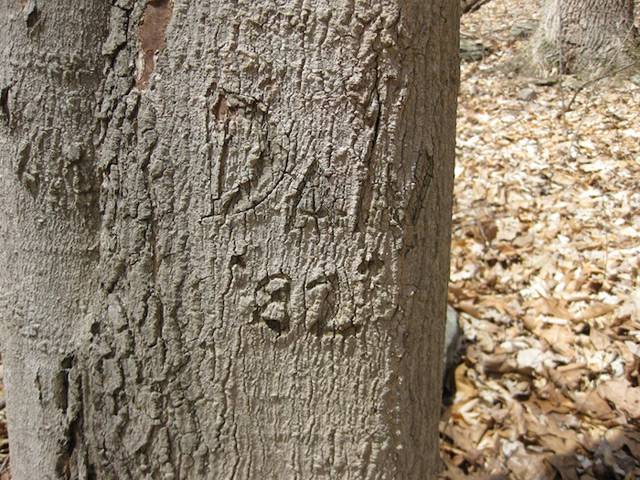
1983: Cory + Tiffany (I like to think this was Cory Feldman and the pop singer Tiffany)
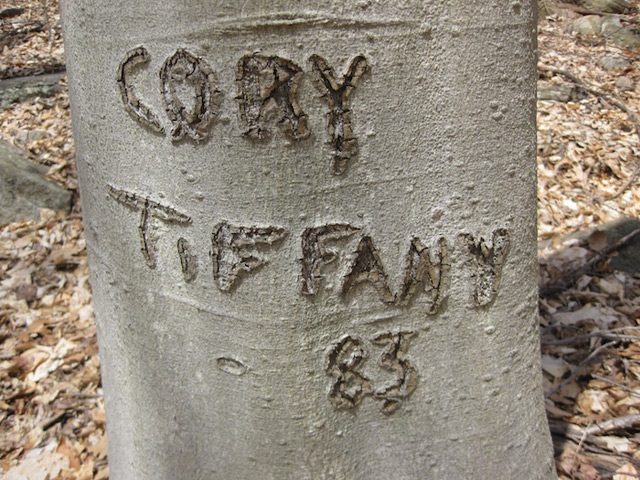
The wider the lettering, the older the carving. Of course, eventually, the message is lost.
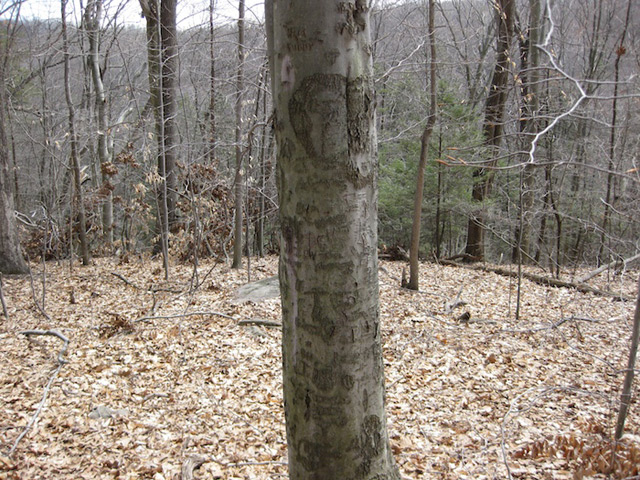
Mary Ann & Robert seem to have come back to their tree three times in the past 35 years.
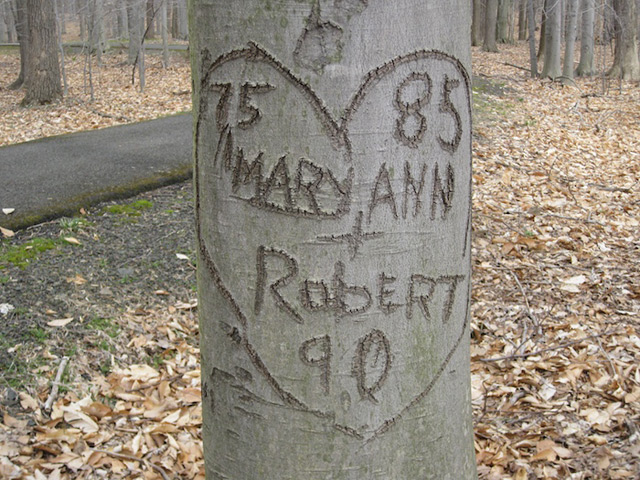
These people tried to preserve a feeling, preserve a moment. They tried to share something with the world, and leave a lasting legacy. And in some ways they have – those etchings are still there. But the moment and the context are now gone. And as strangers like me bump into them, they are orphans, without meaning.
I can’t help but consider that some of the feelings that went into marking a tree are the same that an author hopes to find when seeking publication. That they want to capture a moment – capture their thoughts, their feelings, their expertise – into something that will last. Something that is public and outside of themselves. Something that will be stumbled upon by others, to be discovered, and perhaps wondered at.
There is a great quote from the book “The Peterkin Papers” from 1883:
“We are going to be introduced to Mr. Dickens,” he said.
“I thought he was dead!” exclaimed Mrs. Peterkin, trembling.
“Authors live forever!” said Agamemnon in her ear.
Even beyond immediate affect of a book – of how it educates or inspires readers, and even beyond sales and recognition, I think authors have a romantic vision of people finding their books in an old book shop, years later. That this is indeed a way for the work itself to live on, and for their contribution to our culture to remain immortal. But even those moments, of someone discovering value in an old book, are often private and isolated. They are not shared experiences that can easily be shared further, increasing the value of the work with each discovery.
What I find compelling is how – on the internet – we are able to connect with each other around a book – around THE WORK. When the author is involved – perhaps connecting with readers via social media – that can be an incredible experience. But even without their direct involvement, a community can form around an idea or a story that began in a book.
You see this happen in thousands of small ways each day – within forums, blogs, and social media. And these interactions are public, and they are preserved. A forum discussion between two people is available for others to discover years later, and contribute to, extending the discussion in new ways. So even interactions that seem isolated at the time, are available for others see how we connect to an idea, to a story. And every connection fuels another, then another. These ideas, these stories, they spread on the web in ways they never could in print alone.
The Isolation of Information
For most of human history, we were a storytelling culture. Information and stories were shared person to person, by relaying the same stories again and again. Over time, these stories evolved, they were modified as they were spread across one culture to another, and they became a way for one generation to connect with the next.
Then came books, and books changed the world. When I speak to some folks in publishing, there is a concern that the web – that digital media – is undermining the purpose of books, destroying the business model that supports publishing, and distracting the next generation from the great works of our culture.
Now, books are pretty awesome, but, they are not perfect. And human culture got along without them for thousands of years. In many ways, the web actually enhances the purpose of books – bringing us closer to information, to story, and to the human experience.
Look at this date slip from the back of a library book I bumped into:
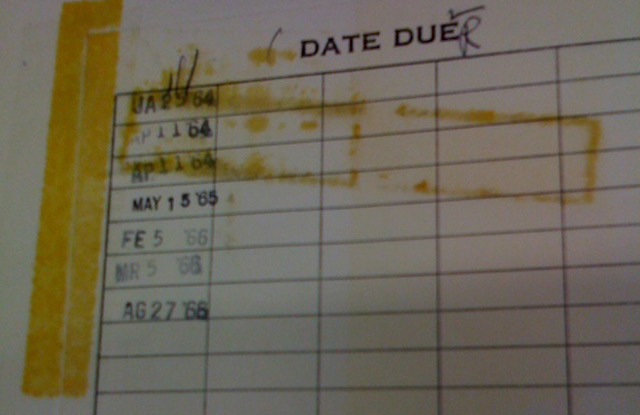
Now, I don’t know if this tells the full history of this book, or if other date slips were missing. But I do think it makes a point – do you realize the steps that are involved to make this book relevant to someone? Sure, the book is AVAILABLE for use, but what has to happen to match need to book?
- Someone has to have a need for information this book may contain.
- They have to go to the library to search for the information.
- They have to enter keywords into a database system, and come up with a book title and brief abstract. Even if the book consists of tens of thousands of words, a person has merely a title and a couple sentences to go on when judging if this book contains the information they are looking for.
- They have to go to the shelves and find the book.
- They have to review it quickly to decide if it may or may not help, skimming through it, looking at the table of contents and index.
- They have to check the book out, bring it home and explore it further to decide whether it really solves their problem or not.
And then, this whole process has to begin again with a new person for the book – for a specific chapter – to become relevant yet again.
This is why Google’s search box is such a revolution, and where Google’s and Amazon’s ability to search within books becomes really important. The web makes tiny nuggets of information relevant at a moments notice. There is one step – one search box – and that is all that is needed to access nearly anything. What’s more – it puts all media – all books – all of the ways that humans share experience, story and information – it puts it all on a level playing field.
Community as Legacy
An author might feel that they will live forever because of their book – but really, that only happens if someone READS their book. The book is not the only essential element here, another person is.
I spoke at a Book Industry Guild event this week, and was asked a great question by John Evans of Simon and Schuster. I’ll paraphrase: “What about 50 years from now, when authors are no longer able to represent their books online via social media. How can the work itself live on in the social media world?”
I loved how forward thinking this was – too much of the book industry (and EVERY industry) focuses only on the next fiscal quarter, or next season. But his question underscored the value of how books contribute to our culture in the long term, that the life of a book is measured in decades (if not centuries and millennia), and that their affect can be profoundly more influential in the long term than best seller rankings of today. That people who may not yet be born, will one day live on to make the work of today relevant in future generations.
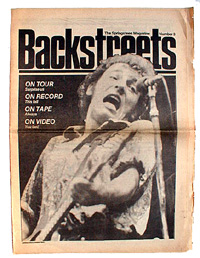 This also touches upon the idea of how a body of work extends to growing a community. Let me give you an example. This week I listened to a two-part podcast that shares the history of the Bruce Springsteen fan magazine Backstreets.
This also touches upon the idea of how a body of work extends to growing a community. Let me give you an example. This week I listened to a two-part podcast that shares the history of the Bruce Springsteen fan magazine Backstreets.
The publisher talked about how, after decades of publishing the magazine, the fan community has actually eclipsed Bruce Springsteen himself in terms of importance. That he publishes the magazine to support the fans and the community around Bruce’s music – that they are the MOST important aspect of this endeavor. Not the magazine – the thing – and not even Bruce. The publisher is working to support a community, and this community will live on and grow in ways that an individual (Bruce), cannot. But certainly, his fans will spread his message, and share his music.
This is what we mean when we talk about building a community when it comes to publishing. A community is not a marketing campaign around the launch window for a book. It is an investment in the future, it is growing a culture of ideas and connections. It is making books relevant not just in 2010, but in 2060.
-Dan














 This also touches upon the idea of how a body of work extends to growing a community. Let me give you an example. This week I listened to a
This also touches upon the idea of how a body of work extends to growing a community. Let me give you an example. This week I listened to a